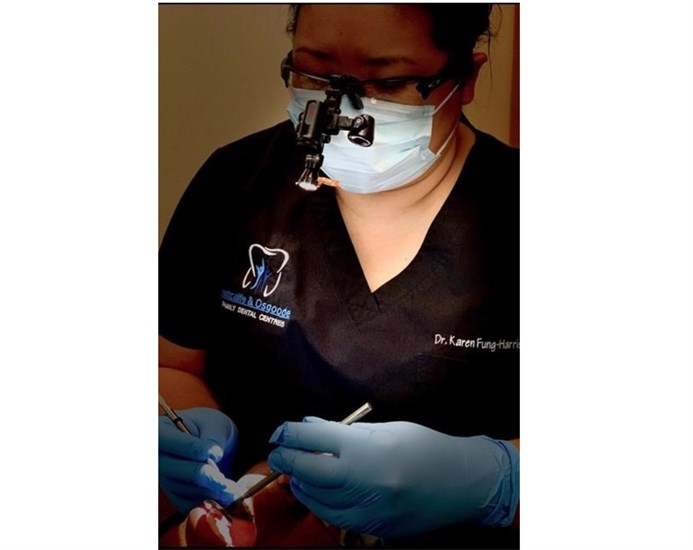
Karen Fung-Harris, a dentist and co-owner of two practices in Ottawa, is shown in this undated handout photo.
Image Credit: THE CANADIAN PRESS/HO - Somer Taylor
February 13, 2020 - 4:30 PM
The Ontario Ministry of Health says it's working with manufacturers of medical masks to address shortage concerns expressed by dentists in light of the new coronavirus outbreak, according to a memo sent to the provincial regulator for dentistry.
In the note sent to the Royal College of Dental Surgeons of Ontario (RCDSO) last week, the ministry said it's aware some orders of personal protective equipment, which dentists need to wear during any routine dental procedure, are backlogged, but added it was "following up to make sure critical shortages are addressed."
The ministry said Thursday in a statement that it is working with the health sector and has "developed systems to identify organizations who are having challenges getting the supplies they need, and have processes in place to ensure that providers are able care for their patients safely now and in the future."
Fear surrounding a new type of coronavirus dubbed COVID-19 that's rapidly spreading in China has prompted a rush from the public to stockpile the protective gear, despite advice from Canadian health authorities that they are not effective for healthy people.
"There are a lot of people wearing masks who don't need to wear masks," federal Health Minister Patty Hajdu said in a press conference earlier this week, adding the government was tracking the situation.
"Canada does have a stockpile (of masks) for domestic use and we have enough supply as we understand the outbreak right now," she said. "There are some rumblings around a supply chain shortage and we're monitoring that very carefully."
The Canadian Dental Association has contacted distributors of masks, gloves and other protective equipment because of concerns raised by dentists across the country, said Aaron Burry, its associate director of professional affairs.
He said suppliers are being "cautious" and "putting measures in place" to control the availability of these products and to prevent stockpiling.
"No one can predict where things may go but to our understanding the supply is sufficient for the next few months," said Burry.
But he acknowledged he has heard about some supply problems and says he has been told that boxes of masks have been stolen from dental waiting rooms.
Karen Fung-Harris, a dentist and co-owner of two practices in Ottawa, said she has had to change suppliers and her costs have gone up.
"Our biggest worry as dentists is that we can't practice without (masks)…and we know there is a shortage."
Fung-Harris says that her usual supplier is out of masks and that although she can still buy small quantities from other suppliers, the price has jumped. She says she normally pays $7 to $9 for a box of 50 masks but because of the shortage she is now ordering different brands, in smaller quantities, from a variety of suppliers and is having to pay $16 to $18 per box.
At her offices, staff use between 75 to 125 masks a day, so the change in cost is not trivial, but her main concern is supply.
"We don't know when we're going to run out and not be able to stock them again," she said.
Infection control protocols are strict for dental office workers, said Larisa Naderiani, dentist and professional practice adviser for quality assurance at the RCDSO.
These include measures that dentists must follow, to prevent the spread of infection, based on the type of procedure being performed.
For a routine dental cleaning or a simple filling, a dentist and hygienist must wear gloves, a mask, a gown or protective clothing and protective eye wear. For more invasive procedures there are additional precautions.
Gloves and masks must be changed between each patient and should also be changed if compromised, for example if the mask becomes wet.
In addition to these normal measures, dental practices are now being asked to screen patients for illness before they come in, upon their arrival at the office and once in the dental chair.
In Ontario, the health ministry has distributed signs explaining COVID-19 screening in English, French, and Chinese.
And Tuesday, the Ontario Dental Association and the college sent an email survey to their members asking about personal protective equipment supply levels and whether they were having any trouble replenishing them.
If a critical shortage of equipment occurred, Naderiani says dentists would be asked to "only take those cases that are urgent or require emergency care."
Patients should follow usual infection control routines by washing their hands and staying home if they are not well, said ODA President Kim Hansen.
—Michelle Ward is a pediatrician, associate professor and journalist in Ottawa. She is currently a fellow in global journalism at the Dalla Lana School of Public Health at the University of Toronto.
News from © The Canadian Press, 2020